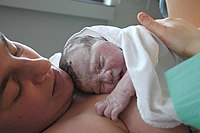
Photo from wikipedia
ABSTRACT Background: Mental imagery may reflect the present, past or future. Childbirth is often anticipated with joy but also in some cases with fear, which may negatively impact on the… Click to show full abstract
ABSTRACT Background: Mental imagery may reflect the present, past or future. Childbirth is often anticipated with joy but also in some cases with fear, which may negatively impact on the childbirth experience. So far, research on birth-related mental imagery in pregnancy is lacking. This study aimed to investigate in detail the phenomenology of spontaneous childbirth-related mental images and the association between main imagery characteristics (valence, positive/negative percentage ratio and impact on behaviour and decision-making) and fear of childbirth. Methods: A concurrent triangulation mixed methods design was employed. Thirty-seven nulliparous, French-speaking women, aged ≥ 18 years in their third trimester of pregnancy completed self-report questionnaires assessing fear of childbirth, spontaneous use of mental imagery, prenatal depression and trait anxiety, and participated in a mental imagery interview to assess spontaneous childbirth-related mental images. Women with a prenatal diagnosis of malformation were excluded. Results: All participants reported having spontaneous mental images of their impending childbirth. The images captured were rich in detail and included a variety of sensory modalities. More positive mental images were associated with less fear of childbirth (r = –0.533, p = .008) and women who had a higher proportion of negative mental images had a higher fear of childbirth (r = 0.428, p = .005). The impact of the most negative mental images on behaviour and decision-making was positively correlated with fear of childbirth (r = 0.342, p = .038). Conclusion: Our results indicate that negative spontaneous childbirth-related imagery is associated with fear of childbirth. Intervention techniques could be developed that focus on enhancing positive childbirth-related mental images during pregnancy and thus fostering a more positive childbirth experience.
Journal Title: Journal of Reproductive and Infant Psychology
Year Published: 2018
Link to full text (if available)
Share on Social Media: Sign Up to like & get
recommendations!